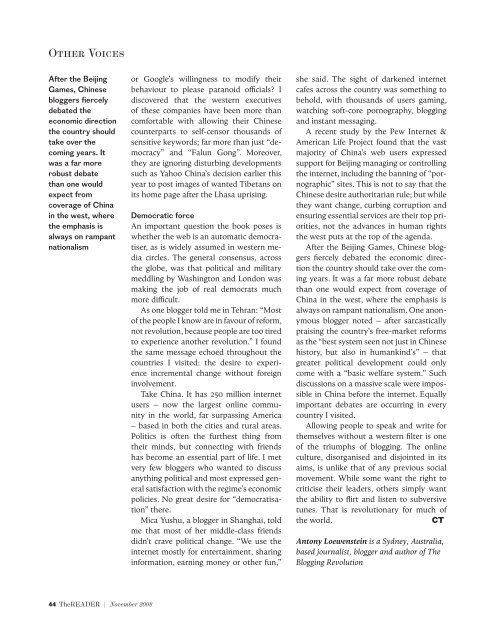Chris hedges AND george Monbiot ON THE IGNORANcE - ColdType
Chris hedges AND george Monbiot ON THE IGNORANcE - ColdType
Chris hedges AND george Monbiot ON THE IGNORANcE - ColdType
You also want an ePaper? Increase the reach of your titles
YUMPU automatically turns print PDFs into web optimized ePapers that Google loves.
other voices<br />
After the beijing<br />
games, Chinese<br />
bloggers fiercely<br />
debated the<br />
economic direction<br />
the country should<br />
take over the<br />
coming years. it<br />
was a far more<br />
robust debate<br />
than one would<br />
expect from<br />
coverage of China<br />
in the west, where<br />
the emphasis is<br />
always on rampant<br />
nationalism<br />
44 thereader | November 2008<br />
or Google’s willingness to modify their<br />
behaviour to please paranoid officials? I<br />
discovered that the western executives<br />
of these companies have been more than<br />
comfortable with allowing their Chinese<br />
counterparts to self-censor thousands of<br />
sensitive keywords; far more than just “democracy”<br />
and “Falun Gong”. Moreover,<br />
they are ignoring disturbing developments<br />
such as Yahoo China’s decision earlier this<br />
year to post images of wanted Tibetans on<br />
its home page after the Lhasa uprising.<br />
democratic force<br />
An important question the book poses is<br />
whether the web is an automatic democratiser,<br />
as is widely assumed in western media<br />
circles. The general consensus, across<br />
the globe, was that political and military<br />
meddling by Washington and London was<br />
making the job of real democrats much<br />
more difficult.<br />
As one blogger told me in Tehran: “Most<br />
of the people I know are in favour of reform,<br />
not revolution, because people are too tired<br />
to experience another revolution.” I found<br />
the same message echoed throughout the<br />
countries I visited: the desire to experience<br />
incremental change without foreign<br />
involvement.<br />
Take China. It has 250 million internet<br />
users – now the largest online community<br />
in the world, far surpassing America<br />
– based in both the cities and rural areas.<br />
Politics is often the furthest thing from<br />
their minds, but connecting with friends<br />
has become an essential part of life. I met<br />
very few bloggers who wanted to discuss<br />
anything political and most expressed general<br />
satisfaction with the regime’s economic<br />
policies. No great desire for “democratisation”<br />
there.<br />
Mica Yushu, a blogger in Shanghai, told<br />
me that most of her middle-class friends<br />
didn’t crave political change. “We use the<br />
internet mostly for entertainment, sharing<br />
information, earning money or other fun,”<br />
she said. The sight of darkened internet<br />
cafes across the country was something to<br />
behold, with thousands of users gaming,<br />
watching soft-core pornography, blogging<br />
and instant messaging.<br />
A recent study by the Pew Internet &<br />
American Life Project found that the vast<br />
majority of China’s web users expressed<br />
support for Beijing managing or controlling<br />
the internet, including the banning of “pornographic”<br />
sites. This is not to say that the<br />
Chinese desire authoritarian rule; but while<br />
they want change, curbing corruption and<br />
ensuring essential services are their top priorities,<br />
not the advances in human rights<br />
the west puts at the top of the agenda.<br />
After the Beijing Games, Chinese bloggers<br />
fiercely debated the economic direction<br />
the country should take over the coming<br />
years. It was a far more robust debate<br />
than one would expect from coverage of<br />
China in the west, where the emphasis is<br />
always on rampant nationalism. One anonymous<br />
blogger noted – after sarcastically<br />
praising the country’s free-market reforms<br />
as the “best system seen not just in Chinese<br />
history, but also in humankind’s” – that<br />
greater political development could only<br />
come with a “basic welfare system.” Such<br />
discussions on a massive scale were impossible<br />
in China before the internet. Equally<br />
important debates are occurring in every<br />
country I visited.<br />
Allowing people to speak and write for<br />
themselves without a western filter is one<br />
of the triumphs of blogging. The online<br />
culture, disorganised and disjointed in its<br />
aims, is unlike that of any previous social<br />
movement. While some want the right to<br />
criticise their leaders, others simply want<br />
the ability to flirt and listen to subversive<br />
tunes. That is revolutionary for much of<br />
the world. CT<br />
Antony Loewenstein is a Sydney, Australia,<br />
based journalist, blogger and author of The<br />
Blogging Revolution
















